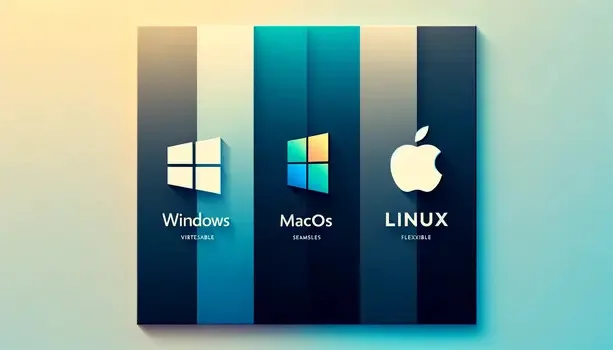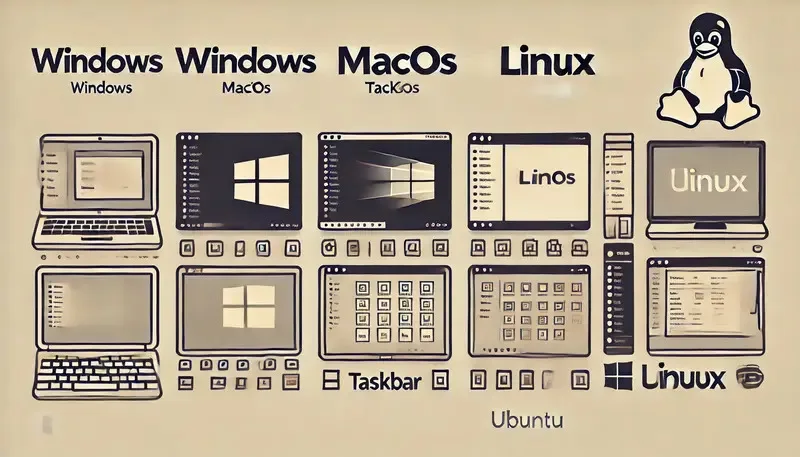
Comparison of Operating Systems: Windows, macOS, and Linux
Choosing the right operating system (OS) is crucial for both personal and professional use. The three major players in the OS market—Windows, macOS, and Linux—each offer unique features, benefits, and drawbacks. This article delves into a comparative analysis of these operating systems, focusing on their interface and usability, application compatibility and support, performance and system requirements, and security.
Interface and Usability
Known for its user-friendly interface, Windows offers a familiar environment for many users, especially those who have been using computers for a long time. The Start Menu and taskbar provide easy access to applications and settings. Windows 10 and 11 have continued to evolve, incorporating touch-friendly features and a sleek design that balances functionality and aesthetics.
Apple’s macOS is renowned for its clean and intuitive interface. The Dock provides quick access to frequently used applications, while Mission Control allows users to manage open windows and spaces efficiently. macOS is particularly praised for its consistency and seamless integration with other Apple products, enhancing the overall user experience for those invested in the Apple ecosystem.
Linux offers a highly customizable interface, which can vary significantly depending on the distribution (distro) being used. Popular distros like Ubuntu, Fedora, and Debian each have their unique desktop environments. This flexibility allows users to tailor their OS to their specific needs, although it can be daunting for those unfamiliar with Linux.
Application Compatibility and Support
Windows boasts the highest level of application compatibility among the three OSs. Most commercial software, including productivity tools, games, and specialized applications, are developed primarily for Windows. This extends to online platforms like Ninja Casino, ensuring seamless access to online gaming and other services.
While macOS also supports a wide range of applications, it falls short of Windows in terms of sheer volume. However, it excels in creative software, with industry-standard tools for graphic design, video editing, and music production being optimized for macOS. Compatibility with online platforms like Ninja Casino is generally good, but users might occasionally encounter limitations compared to Windows.
Linux has made significant strides in application compatibility, particularly with the advent of tools like Wine and Proton, which allow many Windows applications and games to run on Linux. However, the out-of-the-box support for commercial software is still limited. Open-source alternatives are available for most tasks, but users may need to invest time in finding and configuring these solutions. Compatibility with platforms like Ninja Casino can vary depending on the distro and additional software used.

Performance and System Requirements
Windows requires relatively high system resources, especially the latest versions like Windows 10 and 11. Performance can vary based on the hardware, with older systems potentially struggling with the demands of newer software and updates. However, Windows is optimized for a wide range of hardware configurations, making it a versatile choice for various users.
macOS is designed to run on Apple’s hardware, which ensures optimized performance and stability. The tight integration between hardware and software allows macOS to deliver smooth and efficient performance, even on systems with lower specifications. However, this also means that users are limited to Apple’s hardware, which can be more expensive than equivalent Windows or Linux systems.
Linux is known for its efficiency and ability to run on a wide range of hardware, from high-end servers to low-specification devices. This makes it an excellent choice for users looking to revive older hardware. The performance of Linux systems can be highly optimized based on the chosen distro and user configurations, offering a flexible and efficient solution for various needs.
Security
Windows has traditionally been a prime target for malware and cyberattacks due to its large user base. Microsoft has made significant improvements in security with features like Windows Defender and regular security updates. However, users must remain vigilant and proactive in maintaining their system’s security.
macOS is generally considered more secure than Windows, partly due to its Unix-based architecture and smaller user base. Apple’s stringent app review process and regular security updates further enhance macOS security. Nonetheless, macOS is not immune to threats, and users should employ good security practices.
Linux is highly regarded for its security features. Its open-source nature allows for continuous scrutiny and quick patching of vulnerabilities. The Unix-like design of Linux provides robust security mechanisms, making it a popular choice for servers and other critical systems. Users can enhance security by regularly updating their systems and following best practices.
Choosing the right operating system depends on various factors, including user preferences, hardware, and specific use cases. Windows offers extensive compatibility and user-friendly features, making it ideal for general users and gamers. macOS provides a seamless and efficient experience for creative professionals and those invested in the Apple ecosystem. Linux stands out for its customization, performance, and security, appealing to tech enthusiasts and those seeking a flexible operating system. Each OS has its strengths and weaknesses, and the best choice will depend on individual needs and priorities.
